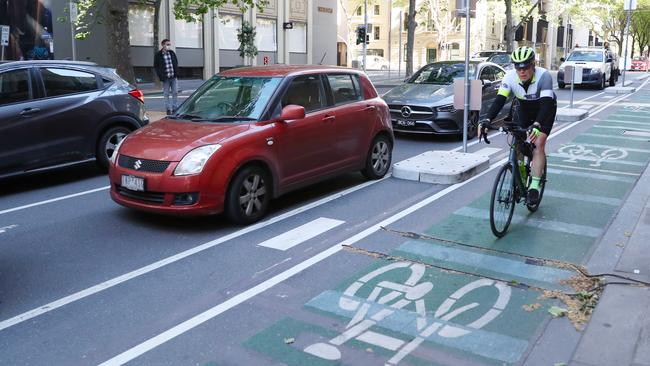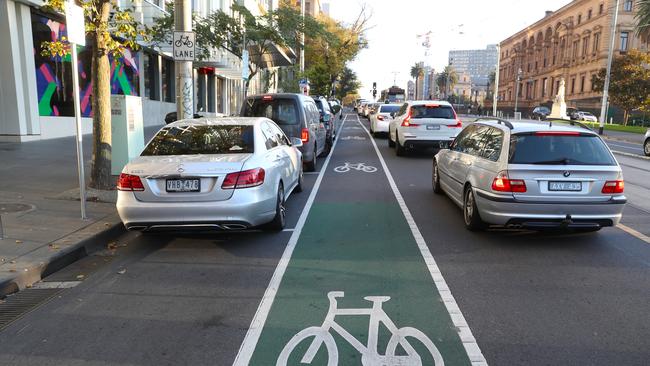City of Melbourne accused of ‘anti-car agenda’ as spending on bike lanes, footpaths revealed
The amount of funding for roads is less than half the amount allocated for footpaths and bike lanes, council budget papers show.
Victoria
Don't miss out on the headlines from Victoria. Followed categories will be added to My News.
The City of Melbourne has been accused of an “anti-car agenda” as it projects to spend more than twice as much on footpaths and bike lanes over the next four years than on roads, budget papers show.
It comes as the bike lobby renews calls for speed limits on local roads without separated bike lanes to be reduced from 50km/h to 30km/h.
The city council recently announced a pause in the rollout of protected lanes in the Hoddle Grid amid a backlash from motorists and businesses about rising congestion as the city emerged from harsh lockdowns.
However, Greens councillor Rohan Leppert clarified the decision, saying the “truth of the matter is that there are no Hoddle Grid lanes anywhere near Department of Transport sign-off, so for 2022-23 we will build the projects that ready to go, outside the Grid”.

Over the next year, the council will spend $19.4 million on footpaths and bike lanes, including $13.5 million on new infrastructure.
Only $8.4 million will be spent on roads in 2022-23, including $5.4 million on renewal projects.
Over the next four years, ratepayers will fork out $69 million on footpaths and bike lanes, but only $31.3 million on roads, says the council’s latest budget.
Groups including the Victorian Chamber of Commerce and Industry, Small Business Australia, and the Transport Workers Union have criticised the rollout of some bike lanes in the CBD, especially in places like Exhibition St.
Communications at free market think tank the Institute of Public Affairs, Evan Mulholland, said the City of Melbourne should be encouraging more workers to come back to the CBD, not making it harder for them.
“Town Hall should learn from the backlash at bike lanes and completely drop its anti-car agenda,” he said.
TWU state secretary Mike McNess said last week that lanes made the city a less safe workplace for its members because of access and parking problems.
Mr Leppert caused a stir last month when in response to a previous TWU complaint about bike lanes, he tweeted that the union “is pro road fatalities”.

A Bicycle Network article on the group’s website said “bike lanes have copped a fair bit of negative press in the past due to their perceived impact on traffic congestion, carparking and delivery vehicles access”.
But it said that drivers’ understanding of how bike lanes impact traffic speed differed depending on which country they lived in, with Australian drivers less sympathetic to protected lanes than Dutch motorists, who thought the lanes would help them drive faster because of the separation.
“Crash research shows that the risk of serious injury and death for people walking and riding decreases with speed limits,” the bike lobby said.
It wants speed limits on local streets without separated lanes cut from 50 km/h to 30km/h.




